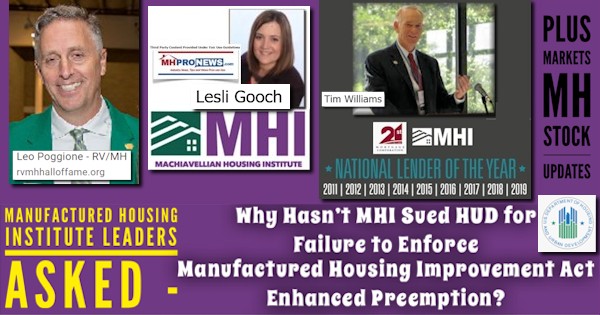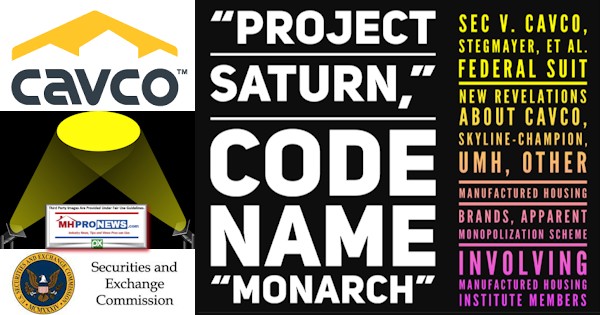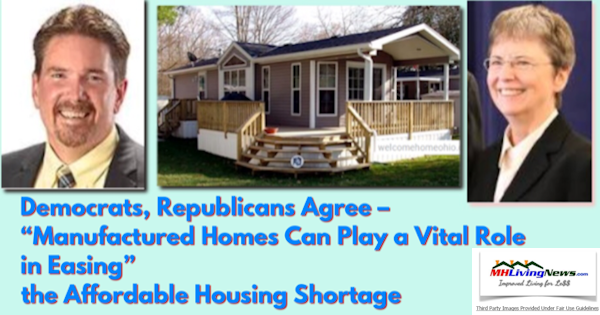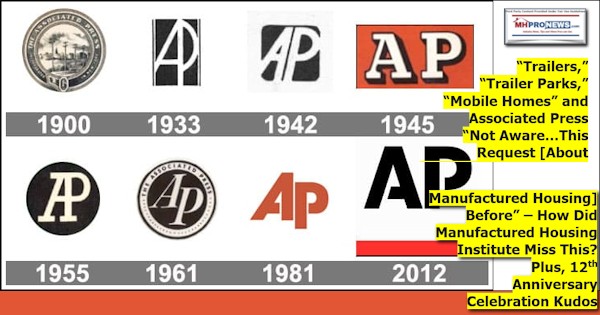Language, markets, and more can be subject to manipulation. There are as a matter of law (federal/state) crimes known as conspiracies. A conspiracy is generally when 2 or more parties enter into an overt act to do something which the law forbids. When a plot to break a law is actually performed, and an arrest is made, the defendants may be charged with both the violation of the law as well as the conspiracy to violate a law. If a plot is hatched, it goes beyond mere musing over drinks, and an overt act to break the law occurs, that could bring a charge of conspiracy (see LawShelf legal video for details). Against that backdrop, a new press release to mainstream media provided below reviews key research that explores that causes, controversies, and possible cures to the affordable housing crisis and manufactured housing’s underperformance. Citing a range of sources and pages of linked and footnoted references, the report calls on public officials to probe and legally pursue apparent cases of market manipulation that apparently violate RICO, antitrust and possibly other laws. These are not baseless conspiracy theories, but rather are serious factual- and evidence-based legal arguments made by sober individuals who provide their research and documentation in support of their allegations.
The text of the release is as shown below. The news release is linked here and has a layout that is different than what is shown below but has essentially the same content. In many browsers and devices, clicking on the image and following the prompts will reveal a larger size. You may need to use your escape or ‘back’ key to return to this page or follow your device/browser prompts.

Causes-Possible Cures Affordable Housing Crisis-Monopolistic Moat-Sabotaging Monopolies-Manufactured Home Controversies
Affordable housing is in crisis. Some 22 million Americans live in mobile/manufactured homes. NAR-Most of 111 million renters could own. Controversies explored.

On 9.7.2021 HUD researchers Pamela Blumenthal and Regina Gray said the causes and cures for the affordable housing crisis have been well known for 5 decades. Per Blumenthal and Gray, “Federally sponsored commissions, task forces, and councils under both Democratic and Republican administrations have examined the effects of land use regulations on affordable housing for more than 50 years. Numerous studies find land use regulations that limit the number of new units that can be built or impose significant costs on development through fees and long approval processes drive up housing costs.”

Former HUD Secretary Ben Carson said on 5.7.2019 HUD was in position to usher in a “new era of cooperation and collaboration between our Department and the manufactured housing industry.” Carson said “This is not just a housing crisis – it has a human face. Homes are at the heart of building strong families, strong communities, and ultimately, a strong country.” Citing manufactured home construction costs about half of conventional housing, Carson said: “dramatic cost savings in construction enable responsible citizens to secure housing that may be considerably less expensive than renting or purchasing a site-built home.”
Manufactured home production centers can be expanded or built in roughly 6 to 12 months. Clayton Homes CEO Kevin Clayton said on behalf of the Manufactured Housing Institute (MHI) that hundreds of factories and thousands of retailers closed since 2005. What explains the lack of progress in manufactured housing acceptance?
Researchers point to several factors. Some point toward controversies in and beyond the manufactured home industry. To frame the discussion, generically, Senators Elizabeth Warren, Bernie Sanders and former President Donald Trump have said “the system is rigged.” Seriously?
James A. “Jim” Schmitz Jr and fellow researchers said that HUD, the NAHB, and builders are using subtle “sabotaging monopoly” tactics to subvert manufactured housing. ProMarket and research published by the Minneapolis Federal Reserve claim such “sabotage” has been occurring for decades.
Samuel “Sam” Strommen for Knudson Law provided research published by MHLivingNews. It points the finger at specific brands, including Clayton Homes (BRK), Skyline Champion (SKY), and Cavco Industries (CVCO). Strommen: “submits…MHI’s conduct in obfuscation judicious decision-making by the [FHFA and HUD] constitutes a conspiracy to restrain trade under Section 1 of the Sherman Act, and by virtue of the misrepresentative nature of the conduct, should not be afforded Noerr protection.”
Strommen claims evidence of “felony” monopolization that appear to violate the Sherman Act and RICO laws creating a “Rube Goldberg Machine of Human Suffering.” “The manufactured home…for tens of millions of Americans today—a great many of whom hail from the lowest socioeconomic stratum, it is a way of life, the only affordable living situation available, and the only means of achieving home ownership.”
Prosperity Now’s Doug Ryan told AmericanBanker its “Time to End the Monopoly Over Manufactured Housing.” “For too long we have ignored a segment of our housing system that offers an affordable path to homeownership: manufactured housing.” Ryan claimed MHI, acting on behalf of Clayton Homes’ affiliated lending units, was “unwilling to criticize” Fannie Mae, Freddie Mac, and the FHFA for excluding “chattel loans” – personal property, home only lending that often finance manufactured homes – from the Duty to Serve (DTS) mandate passed by Congress in 2008.
Lesli Gooch, on behalf of MHI, denied Ryan’s charges. But thus far, MHI CEO Gooch, MHI’s board leaders and attorneys have not yet responded publicly to pages of footnoted allegations detailed by Strommen.
Prior to the COVID19 pandemic declaration, an assistant state attorney general examined evidence similar to Strommen’s. She told MHProNews that there are indications of antitrust and other state/federal law violations.
In a letter to the CFPB, Representatives Maxine Waters, Emanuel Cleaver, Keith Ellison, and Mike Capuano said: “Clayton is the nation’s largest manufactured housing company and has a “near monopolistic” grip on lending to minority borrowers seeking financing for manufactured housing…”
The Nation reported that the “Dirty Secret Behind Warren Buffett’s Billions” was a method Buffett called “the moat.”
Robin Harding in the Financial Times said, “the Buffett definition of good management [for Berkshire Hathaway owned companies] is therefor clear. If you have effective competitors, you are doing it wrong.”
Kevin Clayton in a video interview/transcript found on MHLivingNews said: “Warren…paints an image…about this moat, this competitive moat, and our job [as Berkshire managers] is very simple and we share this…Deepen and widen your moat to keep out competition.” “Some of our competitors do a good job, but our plans are to make that difficult for them.”
These concerns have been raised directly to the FHFA in a document published on 3.25.2021 linked here.
Beyond the Manufactured Housing Association for Regulatory Reform (MHARR), MHProNews, and MHLivingNews, Forbes, GuruFocus, and the Seattle Times have detailed such concerns. In a viral video, HBO’s Last Week Tonight with John Oliver ripped MHI member brands by name, including Clayton and Frank Rolfe. These facts beg several questions, which boil down to this. When will public officials probe and legally act on these troubling issues? ##
MHLivingNews note: Again, in many browsers and devices, clicking on the image and following the prompts will reveal a larger size. You may need to use your escape or ‘back’ key to return to this page or follow your device/browser prompts. The collage of publicly traded information from MHI member firms, along with a range of pull quotes from generally respected and knowledgeable sources sheds light on the contradictions between MHI and their claims vs. their members so-called predatory and/or concerns over illegal behavior.

More From This Source
###
MHI leaders were once more asked to respond to concerns previously raised, such as those cited and linked above. They have also been asked to provide documents on meeting minutes in closed door sessions with Fannie Mae, Freddie Mac, bylaws, and other records. As of this time, MHI has declined comment and production. To see more on that, check out the second linked report below. The bottom line? The evidence is mounting that Strommen, Doug Ryan, and others who have accused MHI, Clayton Homes, and other MHI members of collusion or “conspiracy” to commit actions in violations of the Sherman Antitrust Act, RICO, and possibly other laws continues to mount. As the EIN release said, when will public officials and others step it up and act? ##

Case Against Clayton Homes – Years of Legal & Regulatory Claims




We lay out the facts and insights that others can’t or won’t do. That’s what makes our sister site and this location the runaway leaders for authentic information about affordable housing in general, the politics behind the problems, and manufactured homes specifically. That’s a wrap on this installment of “News through the lens of manufactured homes and factory-built housing” © where “We Provide, You Decide.” © ## (Affordable housing, manufactured homes, reports, fact-checks, analysis, and commentary. Third-party images or content are provided under fair use guidelines for media.) (See Related Reports, further below. Text/image boxes often are hot-linked to other reports that can be access by clicking on them.)

By L.A. “Tony” Kovach – for MHLivingNews.com.
Tony earned a journalism scholarship and earned numerous awards in history and in manufactured housing. For example, he earned the prestigious Lottinville Award in history from the University of Oklahoma, where he studied history and business management. He’s a managing member and co-founder of LifeStyle Factory Homes, LLC, the parent company to MHProNews, and MHLivingNews.com. This article reflects the LLC’s and/or the writer’s position, and may or may not reflect the views of sponsors or supporters.
Connect on LinkedIn: http://www.linkedin.com/in/latonykovach
Recent and Related Reports:
The text/image boxes below are linked to other reports, which can be accessed by clicking on them.


 manufacturedhomelivingnews.com Manufactured Home Living News
manufacturedhomelivingnews.com Manufactured Home Living News
































